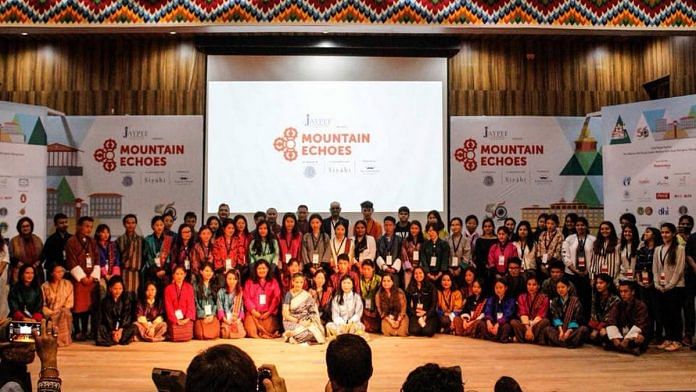New Delhi: Bhutan is approximately 86 times smaller in size than India, and yet the two countries have remained diplomatic best friends, coming together every year for ‘Mountain Echoes — a Festival of Art, Literature and Culture’. The annual festival, held in Bhutan, begins today and is on till 25 August, 2019. It celebrates its 10th edition this year.
The inception of Mountain Echoes
The idea of a cultural exchange between the two countries took form 11 years ago, during the tenure of India’s former ambassador to Bhutan, Pavan K. Varma. “It was just an idea in my head [at the time],” recalls Varma, but with the cooperation and determined efforts of festival director and renowned author Namita Gokhale, founder-CEO of Jaipur-based literary consultancy Siyahi, Mita Kapur, and Bhutan’s Queen Mother, Her Majesty Ashi Dorji Wangmo Wangchuck, the idea became reality.
The name ‘Mountain Echoes’ was an outcome of Gokhale’s own literary vision and is derived from her book, Mountain Echoes: Reminiscence of Kumaoni Women.
“The history of men is recorded in wars won and lost, in the reigns of kings, in edicts and inscriptions, in ruined fortresses and other such grand and exterior things,” wrote Gokhale, but “the history of women is left to us in folklore and tradition, in faintly remembered lullabies and the half-forgotten touch of a grandmother’s hand: in recipes, ancestral jewellery, and cautionary tales about the limits of women’s empowerment”.
“Our whole approach to Bhutan is not one of a big brother, but of a country that sees Bhutan with equal respect and considers itself privileged to have the possibility of partnering with Bhutan,” says Varma.
“What you see is not anywhere close to intimidation, but accommodation, adjustment, mutual benefit and trust,” he adds.
Over 10,000 people are expected to throng the capital city of Bhutan, Thimpu, for the festival. It has grown from a 200-seater hall at the Tarayana Centre in 2010 to “six venues and two cities in Bhutan”, Kapur tells ThePrint from the event site.
Last weekend, a one-day pop-up was held on 17 August in Paro where local artistes took to the stage in a setting that showcased the best of Bhutan’s lifestyle products. Incidentally, an hour away, Prime Minister Narendra Modi stood next to his Bhutanese counterpart Lotay Tshering as they jointly inaugurated the Mangdechhu hydroelectric power plant.
“This unbelievably beautiful country is steeped in a rich culture and is brimming with talent,” says Kapur. She added that bringing in speakers and performers from across the globe to share their lives and culture with a diverse population “has been the trigger and challenge”.
Also read: Badluram ka badan: How military music keeps recruits bang on the beat
The 10th edition
Eighty-eight speakers are set to make an appearance this year, according to the festival’s website, and nearly 60 percent of them are Bhutanese. “There are several sessions in Dzongkha — the country’s official language,” Gokhale tells ThePrint. Of the four co-directors, “two are Indian and two Bhutanese”. They share and discuss ideas to keep the festival both local and cosmopolitan.
The likes of young Karma “Lhari” Wangchuk, Bhutan’s first fashion blogger, will attend the festival. He has been featured by VICE, BBC and more recently, Vanity Fair UK and has helped put his country on the international map.
Other speakers include Tshering Denkar, the nation’s first solo travel vlogger and Pema Choden Tenzin, editor-in-chief of Yeewong, the country’s only women’s lifestyle magazine.
“The transition we have seen over a decade is that the Bhutanese are writing about their issues and their lives in their own milieu, idiom and context,” said Kapur. “This particular edition of the festival is very Bhutanese for the sheer number of Bhutanese speakers who will join us over the three days.”
“These writers cater to varied age groups and diverse cultural backgrounds and fulfil the needs and aspirations of younger Bhutanese,” she further adds.
Some of the Indians participating in the festival are Aamir Wani — a Kashmiri photographer inspired by Agha Shahid Ali who has over 85k followers on Instagram; award-winning poet Arundhathi Subramaniam; authors Malvika Singh, Swapna Liddle and Makarand Paranjape; India’s principal economic advisor Sanjeev Sanyal; food writer Marryam H Reshii; actor Richa Chadda and screenwriter-director Abhishek Chaubey.
A tale of commerce and creativity
“The festival is difficult to raise funds for,” explains Kapur, adding “most large-scale corporations and companies find that Bhutan brings them limited visibility.”
An initiative of the India Bhutan Foundation, Mountain Echoes has seen its budget jump from Rs 35 lakh in the first year to Rs 1.5 crore in 2018. A large part of its sponsorship is in the form of barter-based transactions.
“We’ve had to make innovative funding policies, [but] the seed fund for every edition of Mountain Echoes is provided by the India Bhutan Foundation, the project initiator and our principal sponsors, the Jaypee group.”
The festival was earlier to be powered by the Government of Rajasthan during BJP Chief Minister Vasundhara Raje’s term. The collaboration appears to have come to an end with a change in state government this year.
According to Gokhale, “Every festival faces challenges, but we have made a mark on the minds and hearts of our audiences, and that has sustained us. There are writers and creative people from around the world who have been a part of Mountain Echoes, and this circle of goodwill has only expanded over the years.”
Also read: Folk, hip-hop & country — regional music videos from Northeast are all the rage on YouTube



